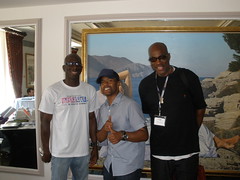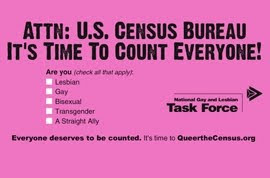The LGBTI Summit 2009 in Chicago

A major step forward in the LGBTI Health Movement and a generator of a road map forward
By Chris Bartlett
When I arrived in Chicago for this year's
LGBTI Health Summit last week, I was feeling a bit daunted by the numerous challenges that await those of us working in the fertile fields of LGBTI

health: The health care access battle currently playing out in Congress and in every state. The invisibility of queer elders. The need for more funding and other support for bi and trans health programming. The recognition that some of our crucial community based organizations might not successfully weather the storm of the current economic crisis. It all felt so heavy.
Some of you know that I dwell in the land of Assets Based Vision (sometimes known as optimism), so I was pondering, on the Orange Line trip to the hotel, ways that I could use the Summit to re-energize myself, focus on exciting priorities, and most importantly, have some fun. So I planned to reconnect with my tribe of queer health folks- many of whom I have known for over ten years, and one (yes, that's you
Bill Jesdale) who went to college with me in the distant year called 1985. These folks really have come to feel like an important family for me -- a group of men and women I feel accountable to in my work and play. By the time I got off the Orange Line and trundled over to the Hilton, I was feeling ready to engage.
The tendency at most conferences is for participants to be passive recipients of information, but at the LGBTI Summit we create a space where every participant has the authority (and responsibility) actively to transform their experience-- through creating a last-minute workshop, or through sassily engaging with presenters, or through
tweeting critiques from the audience. When people said to me that they wanted more sex-positive workshops, or more engagement with edgy themes, I said-- go ahead-- MAKE IT SO.
And the good news about the LGBTI Summit Chicago is that many people made it so. The
Gay Men's Health Agenda gathered further steam as Summiteers participated in plans to move that key policy work forward in Washington, on the state level, and in our local towns. And we also discussed the growth of lesbian, bi and trans health agendas. Engaging plenaries focused attention on movement leadership, the power of data collection (and data caveats-- hence Scout's Law of Fake Queers -- if you misidentify some non-LGBT folks as LGBT, you screw up your data), and our responsibility towards LGBT elders (of course this is my key focus right now, but I can see Elder at the end of my own tunnel). Rebecca Fox, the unstoppable Director of the
National Coalition for LGBT Health, was omnipresent at the Summit- exerting her leadership to remind us of this unique moment in history where we can bring LGBT folk to the table of health care access.

So topically, we made it happen- the role of public health (including the ways its institutions can impact our health negatively), the health of health organizers ourselves (a touchy topic) , trans-inclusive health care and insurance, the power of resilience in LGBT families, vigorous anti-tobacco activism, poisonous anti-queer stigma, and numerous other hot topics. Keeping up with the spirit of active engagement, the audiences challenged presenters (including me) to show why our ideas made a difference for our health.
And outside the presentations we made it happen relationally. One key moment of the Summit was an impromptu gathering organized by
Trevor Hoppe and Erik Libey-- an opportunity for drinks, pizza and chocolate (so much for queer nutrition) but also a chance to meet one-on-one with the presenter who pissed you off, or the Sister who helped to explain community to you, or the Executive Director of a nationally-known LGBT health center, or the famous thinker who transformed trans research. They were all there-- and the Summit is created to break down traditional hierarchies-- so you could meet them all and engage with them as-- gasp-- human beings. There is something to understanding that behind the ideas and the presentations and the research papers, every person in the room had a similar commitment to queer health as they see it.
I should also mention that the Summit is one place where events that enter the realm of the spiritual (a key realm of health) are given their due-- whether that is the Sisters of Perpetual Indulgence celebrating joy and banishing shame on a bar crawl, 12 step meetings in the morning and evening, the spiritual peace brought on by a good shoulder massage, or a Radical Faerie heart circle bringing together pagans, faeries, and the curious for some moments of sharing those dreaded feelings. When the Summits are most successful, both presenters and participants experience their engagement as relaxing and perhaps even health-inducing.
We reached the apex of ideas, engagement, and relationship at the public forum "Risky Business-- Reclaiming Pleasure"- co-sponsored by the LGBTI Summit,
LifeLube and Chicago's impressive LGBT
Center on Halsted. At one point, I stood up from the front of the auditorium to look out at the audience-- a mix of generations of the international LGBT health movement, as well as media and Chicago queers. Though the topic (barebacking, unprotected sex, community health, promoting pleasure) was bound to be interesting (and was), I was more interested by the experience of community in the room- the sense that the conversation (both from the panelists and the audience) really mattered, and that despite accusations of LGBT apathy, our communities are more engaged than ever with the key questions of how to build upon our community assets, and how to address the challenges that we will continue to face.

So whither the Summits and the movement? In the ten years since the Summit movement started, dozens of new LGBT health organizations have been created; research has gradually expanded to focus upon the breadth of queer health, access to LGBT-friendly health care has expanded, and three generations of LGBT health organizers have grappled with the key questions of what we mean by LGBT health and how to make it happen. There's no doubt that the movement has been a success, and the Summits have been the major public expression of this movement. To me, the measure of our ongoing success will be our ability (through Summits and the work that emerges from them) to produce specific measurable results in our movement and communities. More funding for LGBT health projects. The jettisoning of homophobic and transphobic policy in Washington and in our state capitals. Growing visibility of bi and trans health programs, research, and activists. Strengthening partnership with the HIV/AIDS movements, and with organizers in communities of color. A strengthening of the fabric (lace? felt? spandex?) of our intergenerational organizing.
We need to be aware of our ongoing goals and intentions, and we need to grow the structure to implement our goals. We have succeeded with a campaign of placing a whole generation of queer health activists in the communities and organizations nationally where they can make a difference. Are we willing to take responsibility and accountibility to bring about the huge visions and projects that were discussed last week in Chicago? Are we responsible to MAKE IT SO?
At the forum at the Center on Halsted, Cornelius Baker, a long-time leader in the LGBT Health,

HIV/AIDS, people of color, and many other movements, put his arm around my shoulder and asked me if we were ready to take the work to the next level-- to really insist upon greater power, more accomplishments, and further success. Cornelius reminded me that
Eric Rofes (pictured right), one of the founders of this movement, would have wanted to see continued results. So let's map out the strategy, and continue to demand the results.
Rofes indeed was always a visionary. I leave you with a number of questions posed by him in his letter to the 2002 LGBTI Summit in Boulder. I think they remain pertinent questions for our future:
1) Who is responsible for setting an LGBTI health agenda and overseeing its success?
2) What should be our health movement's agenda with the administration in Washington?
3) What structures currently exist to move forward the priority items on our collective agenda?
4) Should we commit to future LGBTI health summits and make a powerful collective effort to build a grassroots movement in the United States?
[check out pics from the Summit]




































